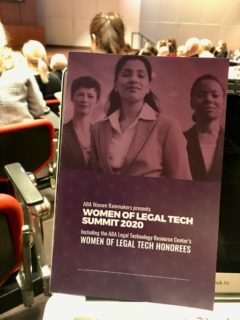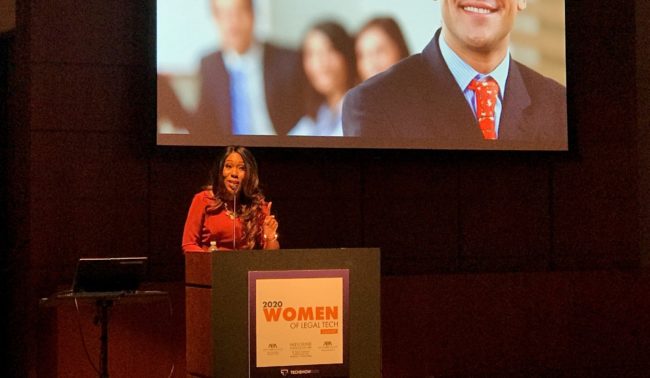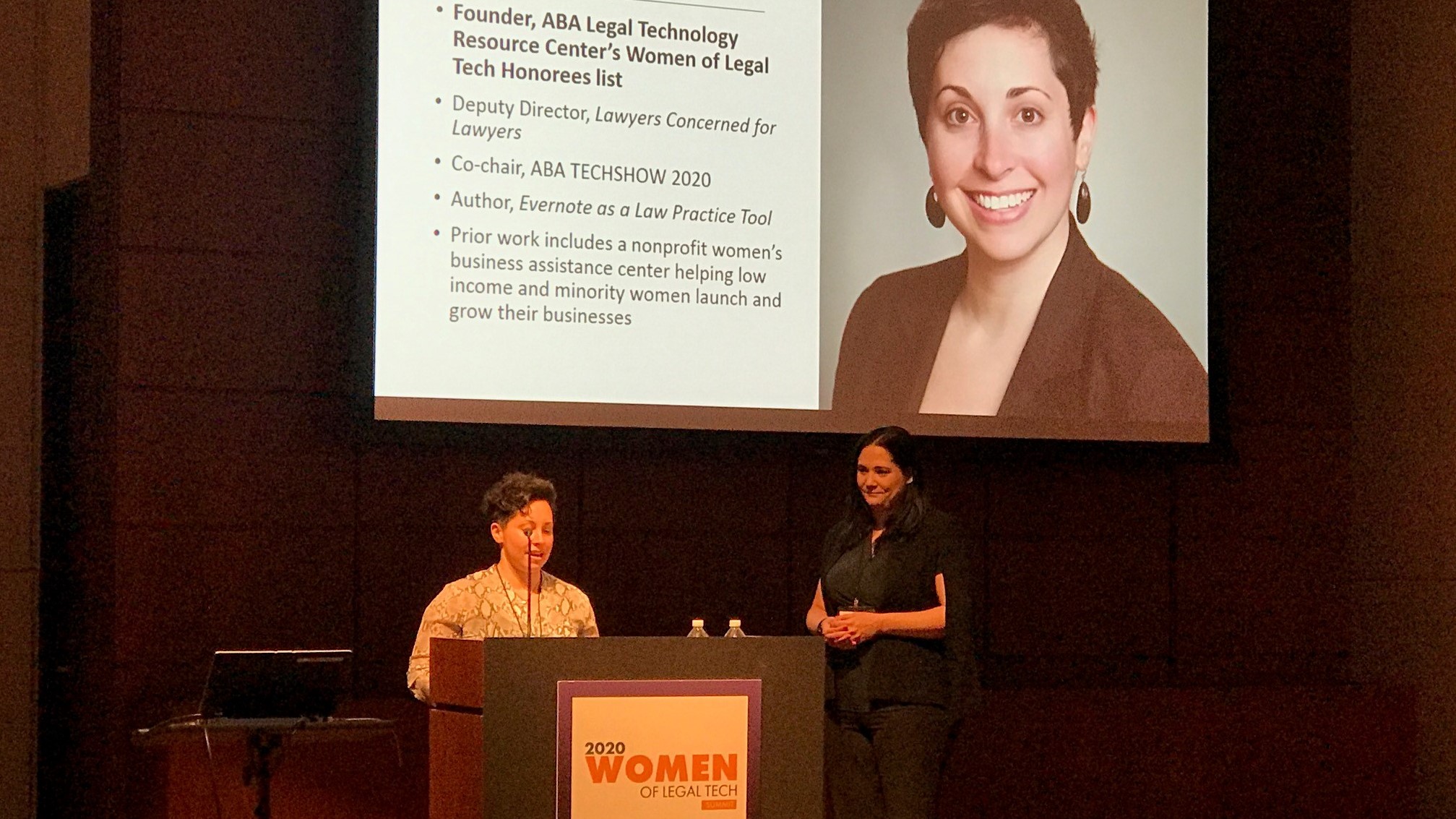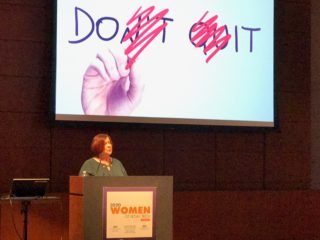A special guest post by legal affairs writer and editor Molly McDonough, former editor and publisher of the ABA’s flagship magazine, the ABA Journal.
The last thing I expected to hear at the 2020 Women of Legal Tech Summit was this: I don’t feel like I deserve to be here.
A version of this self-deprecating sentence repeated a few times as speakers and honorees took the stage for the third-annual summit at Chicago-Kent College of Law to focus on ways to close the legal tech gender gap.
It was a jarring sentiment considering the summit’s organizers from ABA Women Rainmakers pulled together a powerhouse lineup of 13 rapid-fire presentations, and along with the ABA’s Legal Technology Resource Center recognized 21 Women of Legal Tech honorees.
 The announced plan was to honor 20 women, but organizers added honoree No. 0, Heidi Alexander, who started the list in 2015. This is the third year the list was announced at a summit alongside ABA Techshow.
The announced plan was to honor 20 women, but organizers added honoree No. 0, Heidi Alexander, who started the list in 2015. This is the third year the list was announced at a summit alongside ABA Techshow.
In establishing the list, Alexander’s goal was to encourage more participation in legal tech development by women, who are underrepresented at the higher ranks of law firms and even less so in the burgeoning legal tech field.
Wednesday’s keynote speaker, MothersEsquire Founder Michelle Browning Coughlin, noted that male tech owners outpace women six to one, and only 13.8% of legal tech founders are women. And when it comes to funding, the story is worse. Women in technology are only receiving about 2% of venture capital funding — at least that was the case in 2016 when Fortune Magazine examined investments by gender. The next year, Fortune reported that investments in women-owned businesses were getting worse.
It’s no wonder women continue to feel and express that they don’t belong. But at the summit, there was a strong sense that change was coming, albeit slowly. Part of the reason for that coming change is that many women have opted to abandon traditional ladder climbing. Or as virtual law firm founder Darlene Tonelli put it, when she realized she didn’t want a seat at the table that was built in a different era, she opted to build her own table in the form of Inter Alia Law.
“If I don’t want a seat there, it doesn’t mean I can’t hack it,” she said as she encouraged the audience to reframe what success looks like. “We’re powerful already, and our ideas make sense, and we can build things, so let’s build this new table together, for everybody.”

Temi Siyanbade of @TOSLegal has made it her mission to tackle self-confidence hurdles and empower leaders.
Other Ignite-style presentations offered their own encouragement and roadmaps to success for women in legal tech. Temi Siyanbade of @TOSLegal has made it her mission to tackle self-confidence hurdles and empower leaders. And 2nd.Law Chief Operating Officer Emmy Klint finds inspiration in her network or her “raft of bitches,” a refrain echoed throughout the remainder of the day. “Raft of bitches” is a reference to a feminist call for solidarity. The story is that sea otters (known as bitches or sows) will hold hands in the water, forming a raft for security.
Because there are too many who stay silent when there are opportunities for progress, Helen Gulgun Bukulmez, CEO of ECE R.O.I. Consulting, took on the “bystander effect.” She said it’s simply not acceptable to sit back and watch terrible things happen to others, including colleagues and other women in your field. Her advice: Don’t just stand there. Say something. Do something. Then, something will change.
MyCase Legal Technology Evangelist Nicole Black pressed for a greater presence and amplification of women on social media. She proposed a hashtag #LegalTechX2 that would help women in tech share the love, create a tribe, and spread the word.
Legal Cloud Technology President Pegeen Turner shared the ups and downs of developing and launching the analytics tool myFirmData. Despite failures, she said women in legal tech should be encouraged to move forward, like NC State Coach Jim Valvano and his 1983 team, “survive and advance.”
Penn State Law Dean Hari Osofsky shared her sense of urgency in breaking down traditional law school and university system silos to create cross-disciplinary programs to modernize legal education. And on the lawyer regulatory front, Jayne Reardon, executive director of the Illinois Supreme Court Commission on Professionalism, challenged women to boldly go where no man has gone before and consider whether current regulatory rules promote professional independence or negatively impact the delivery of legal services.
The ABA Women Rainmakers Committee plans to hold a free webinar on March 18 to continue the conversation. I hope none of the women participating in that program believe they don’t belong in the spotlight.
 Molly McDonough is a longtime legal affairs writer and editor. Before launching McDonough Media, she was editor and publisher of the ABA’s flagship magazine, the ABA Journal.
Molly McDonough is a longtime legal affairs writer and editor. Before launching McDonough Media, she was editor and publisher of the ABA’s flagship magazine, the ABA Journal.
 Robert Ambrogi Blog
Robert Ambrogi Blog
